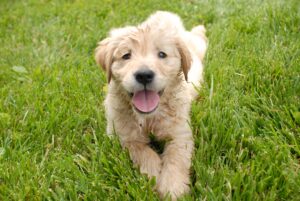Bringing a puppy into your home is the beginning of a special journey. As hosts in this new relationship, it’s our responsibility to ensure our four-legged friends adjust well to their surroundings. A crucial part of this process is socialisation.
Socialisation involves intentionally exposing your puppy to positive experiences. This is particularly important in the first three months of a puppy’s life, laying the foundation for them to enjoy interactions with other dogs, people, and various places.
 The first stage, known as ‘Primary Socialisation,’ occurs between three and five weeks, with breeders playing a key role in helping puppies get used to their mom, siblings, and surroundings. During this phase, puppies that are destined to be family pets experience different sights, sounds, smells, and textures, jumpstarting the socialisation process.
The first stage, known as ‘Primary Socialisation,’ occurs between three and five weeks, with breeders playing a key role in helping puppies get used to their mom, siblings, and surroundings. During this phase, puppies that are destined to be family pets experience different sights, sounds, smells, and textures, jumpstarting the socialisation process.
When your puppy is eight weeks old and comes home with you, the ‘Secondary Socialisation’ period begins. Now, it’s about introducing your puppy to your home and the world outside, ensuring they meet lots of people to build confidence.
 The initial month at home is vital. Your puppy needs to get to know the people they’ll see every day, like kids, adults, and professionals such as groomers and vets. They’ll also learn about their crate, enjoy chew toys, spend some time alone, and understand where to go to the toilet outside.
The initial month at home is vital. Your puppy needs to get to know the people they’ll see every day, like kids, adults, and professionals such as groomers and vets. They’ll also learn about their crate, enjoy chew toys, spend some time alone, and understand where to go to the toilet outside.
This first month shapes a happy, well-adjusted puppy, forming the basis for future training. Skipping socialisation can make life challenging and even risky for both you and your dog for the rest of the dog’s life.
Contrary to what you might think, socialisation doesn’t stop after the first month. Dogs continue to meet new people throughout their lives, and how well they were socialised early on affects how they react to new faces later.
At 12 weeks, once your puppy is fully vaccinated, it’s time to focus on socialising with other dogs. Longer walks, puppy classes, and visits to places where strangers are present become important. Puppies need to learn that strangers, other dogs and vehicles all move and they have nothing to do with your puppy.
Well-socialised dogs are more likely to play nicely and have gentler bites, thanks to early interactions with other puppies that teach them ‘bite inhibition.’
Understanding ‘bite inhibition’ means your puppy learns not to bite too hard during play. Puppies learn how strong their jaws are initially through play with their littermates. We can teach our puppies not to play bite by simply standing up, walking away and leaving our puppy alone for 30 seconds if their teeth make contact with our skin. Removing yourself like this teaches puppy that if they bite, you’ll go away. Something they want to avoid. If walking away is impossible or if your puppy is attached to your trouser leg!, redirecting them onto a toy is a good tactic.

Being consistent is key in teaching bite inhibition. Over time, your puppy learns to control the force of their bites, making them less likely to cause harm as they grow up. The positive exposure to the people, places and things puppy needs to understand sets the stage for a well-behaved and safe adult dog, making the socialisation journey a success.
